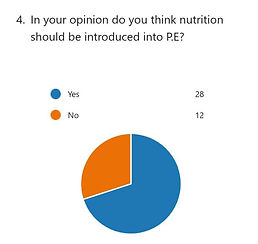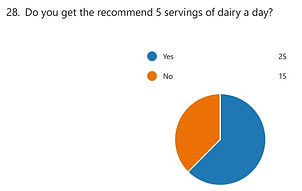
Can the Introduction of a Nutrition CBA inline with the Standard Home Economics Curriculum, be Introduced into the Mandatory PE Junior Cycle Course to Help Tackle Childhood Obesity?

Harry Ross

Joshua Ross

Muireann McCarthy
About Us
We are three 5th Year Students in St Brogan's College, Bandon. We are researching the childhood obesity crisis in Ireland, in relation to its causes and effects on children aged between 13 and 18 years of age.
Our main focus is to see if introducing a nutrition CBA inline with the Home Economics curriculum, into the Junior Cycle PE course could help combat and reduce childhood obesity.

What is Obesity?
Obesity is where an individual's weight is 20% above their recommended weight, based on their height and gender.
Health risks with Obesity
-
Psychological problems e.g. depression
-
Stroke
-
Sleep apnea (one or more pauses in breathing or shallow breaths during sleep)
-
High blood pressure (hypertension)
-
Coronary Heart Disease (CHD)
-
Type 2 diabetes
-
Arthritis
Causes of Obesity
-
Incorrect energy balance: When a person's calorie intake is greater than their energy output, excess energy is stored as fat.
-
Poor food Choices: Choosing foods high in sugar, fat and salt can lead to energy imbalance and weight gain.
-
Hormonal imbalances: Throxine (a hormone produced by the thyroid gland) can influence levels of metabolism.
-
Lack of Physical Activity: Inactivity causes energy from food to be stored up as fat and lead to weight gain.
-
Emotional or Psychological issues: depression, stress or low self-esteem can cause people to turn to comfort foods, which are high in sugar and fat to fell better. This leads to weigh gain.
Aims of our Investigation
The aims of our investigation were:
-
To investigate Ireland’s obesity prevalence and statistics, the main causes and its effects on an individual's life.
-
To increase awareness of Ireland’s worrying obesity trends.
-
To investigate if the introduction of a nutrition strand in line with the standard Home Economics curriculum could be introduced into the Junior Cycle PE course, to help tackle and reduce childhood obesity.
-
To increase awareness of the importance of maintaining a healthy and balanced diet.
-
To see the differences in nutritional knowledge between Home Economics and non-Home Economics students and see if areas can be improved on.
-
To create leaflets and an informative website to outline obesity, its causes and effects, while also developing an action plan with tips on how to reduce the likelihood of obesity.



The Process
1. We researched the benefits of maintaining a healthy, nutritious, balanced diet and what nutrients are most important for sustaining a healthy body.
2. We investigated the benefits of nutritional knowledge through analyzing previous statistics, reading news articles and consulting with our PE, Home Economics and Science teachers.
3. Previously, in 2020 we worked with two cohorts on revealing if the introduction of Home Economics as a mandatory Junior Cycle Subject would help tackle and reduce childhood obesity prevalence.
4. In 2023 we realised it would be of great benefit to instead introduce a nutrition CBA inline with the Standard Home Economics curriculum, into the PE Junior Cycle course. Tjis was because PE is a mandatory subject and would result in all studentd from 1st to 3rd year being educated on nutrition and how to make wiser, healthier food choices and lifestyle decisions.
5. Our survey was made up of questions on the five main nutrients and lifestyle choices of each student.
6. A 4-week short course was prepared and taught to educate students on nutrition.
7. The survey was repeated once the course is completed, and the data was analyzed using SPSS statistics software 25.
8. We drew up our conclusions, revealing if the introduction of a nutrition strand would help combat childhood obesity.
9. We decided on creating informative leaflets and a website that will be accessible by all students and parents in St Brogan’s College for information and tips on how to maintain a healthy diet and lifestyle.
Results
In 2020 we received data from 200 students. 100 Home Economics students and 100 non-Home Economics students. We revealed:
-
Only 15% of Home Economics students were an unhealthy weight in comparison to 39% of non-Home Economics students.
-
Home Economics students scored considerably higher in our food choices and lifestyle decisions survey.
-
In 2023 we surveyed 40 random 1st Year students on nutritional knowledge prior to teaching a short nutrition module. We then resurveyed after teaching. We revealed:
-
At the end of the module 70% believed a nutrition short course should be introduced into Junior Cycle PE.
-
Average nutritional knowledge increased from 6.17 out of 10 to 8.00 out of 10.
-
Only 63% receive the recommended 5 servings of Dairy a day for their age.
-
Questions answered correctly went from an average 61.25% before teaching to 90.38% after.



